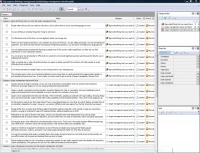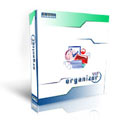|
Task Management Software |
 |
|
|
|
|
| |
|
 TESTIMONIALS TESTIMONIALS
|
|
"...This is an excellent program. I'm so glad that I stumbled on to this when researching for task management programs. Very low learning curv, quite flexible, and the price is right. Tried at least 20 other programs, either too complicated, too expensive, or poor documentation..."
Chad Lindsey -
Honolulu, HI
|
|
|
|
|
|
|
|
Anger management checklist |
|
|
|
|
|
|

 |
This anger management checklist is created to help all people in order of preventing stressful situations and objectionable consequences related to our demonstration of anger. Anger is one of the normal human’s emotions, but sometimes when anger gets out of control and turns destructive, it leads to problems in personal, social and professional life. This checklist will help you to know if you have problems with anger, and will tell you some tips on how you may better understand and handle this powerful feeling until it becomes a problem.
|
| Order 750 checklists in MS Word and PDF printable format at $49.99 USD only. |
BUY NOW!  |
Signs identifying that you need help:
- People often tell you that you need to calm down, not to yell at them or not to use bad language so much.
- You are drinking or smoking frequently trying to calm down.
- You feel tense much of the time, so even slightest matter can enrage you.
- When you are irritated at someone, your emotions are just over-the-top – you are yelling too loudly, you are not listening to opponent, your face and eyes become red because of high blood pressure, you are poorly controlling your language and gestures.
- You can easily become irritated and shouting at people even if the cause is really insignificant, so after this you feel repentance of your inadequate reaction.
- You can answer too emotionally or offensively to someone’s normal and legitimate question just because he disturbs you in inappropriate moment.
- After a working day or other stressful activities you aspire to isolate yourself from contacts with other people to avoid offending them accidentally.
- Your family and beloved complain that you are hurting them by your intemperance.
- The extreme case is when your emotional explosions are so strong that you apply physical force against other people, or just smashing things around you. In such cases you surely need to get a course of therapy from qualified specialists.
Issues and facts:
- Certain amount of anger is necessary to our survival; it becomes a real problem when we cannot control emotions effectively and anger begins to ruin our social, professional and personal life.
- Anger is usually a secondary emotion primarily caused by feeling hurt, fear or vulnerable. We may immediately jump to anger just because that’s more acceptable to us as a reaction to a confusion of any kind.
- Anger can be expressed externally and internally. When externally, people just outbreak with rage (yelling, throwing things etc), and when internally, anger is held within without significant external demonstration – this is even more dangerous as anger may “accumulate inside” and lead to mental or health disorders, developing addictions, etc.
- At the present, experts say that anger doesn’t have a neurological basis any more than any other feeling, and also there is no hereditary disposition to anger. However, we are born different and some signs of our further character are present from a very early age – from early childhood some people are irritable, touchy and easily angered more than other children.
- People suffer from a certain kind of illness called “intermittent explosive disorder” which results in anger as a secondary emotion, causing an outbreak of rage with smashing things, yelling at people and so forth.
- Medication is not used to directly treat anger. Doctors can prescribe some anti-depressants to be used as pills to reduce explosive disorders, but more often they are used to temporarily relieve symptoms associated with anger, such as anxiety or depression.
- We become angry when affected by the interpretation of an event. That’s why in the same situation different people may react differently – someone reacts with strong emotions while someone else stays completely calm.
- Anger (or Wrath) is recognized in Christianity as one of the Seven deadly sins, because this feeling causes self-destructiveness, violence, and hate; it can make people temporarily “blind” on what they do and say.
- You need to remember that anger is a feeling that is here today and gone tomorrow, but while driven by this emotion we can afflict others with the pain and backlash that are hard to forget.
- Family background plays a role. According to researches, people who are easily angered come from families with disruptive, chaotic atmosphere, from parents who are not very skilled at emotional communications.
Exercises and tips:
- You should remember that effective communication, self-awareness and stress management are tools for preventing anger outbursts. If you think you have problems with anger, then you should consult with a qualified psychologist who supervises groups.
- Try to process the situation considering its right and wrong, probably your anger is just a result of erroneous interpretation of events. When you will study the situation from different points of view you will probably understand it better and calm down.
- Take a time-out – if possible just leave the situation to take some time to cool off. Use this time to cool down your emotions, think about what is happening, where you agree and disagree, how you can handle the situation to prevent a conflict. Get back and start again calmly or just neutralize conflict with a joke and stop arguing at all.
- There are three main approaches to handle your anger – expressing, suppressing, and calming.
- You can express your anger in an assertive manner which is different from being aggressive and pushy, and this is probably the healthiest way to handle anger.
- You should clearly, calmly and rationally express what your needs are and how they can be met, without using bad language, yelling, fighting etc. You should learn how to stay respectful even if you feel really angry. Assertive expression is probably one of the main anger management techniques which should be learnt by everyone.
- Anger can be suppressed if it cannot be expressed anyhow, but this is not the best way to react as anger turned inward can be converted or redirected. When anger is frequently turned inward it may cause hypertension, high blood pressure, or depression. Suppressing anger can also lead to passive-aggressive behavior such as getting back at people indirectly, becoming hostile and revengeful.
- You should learn to calm down from inside which means not only controlling your outward behavior, but also controlling your internal responses and reactions.
- Reasoning from your experience, or as a result of participation in programs supervised by professional psychologists, you need to elaborate and adhere to your individual strategies that are about reducing both your emotional feelings and the physiological arousal causing them.
- You should analyze what triggers you to become angry, so even if you cannot avoid or change some factors, you can learn yet how to control your reactions, making them more constructive, interpret events in a different way, and respond rather assertively, than disruptively.
- When you’re feeling that anger is growing inside you – take a deep breath through your nose and exhale slowly. Do this three times and say to yourself “I am getting calm, calm, calm…”.
- Know about your stress and how it underlies your anger. Learn to reduce and control it. If someone tries to irritate or wind you up, then just smile at them, do not jump into conflict and try to lead the conversation/situation out of conflict vein. If you feel emotional stress or your body is tensing up try to relax it bit by bit – breath, think about some good things, listen to music etc.
- Study and train skills like self-control, self-talk, being more flexible in perception and interpretation of the events, practice assertive expression of anger and others.
- Kids can be taught to understand and control their angry feelings from early age, this can be done through special games which cultivate patience, there are also special games for adults, and they are usually practiced on sessions of anger management therapy.
| Order 750 checklists in MS Word and PDF printable format at $49.99 USD only. |
BUY NOW!  |
|





 |
CentriQS Tasks Management Solution 
Looking for multi-user task management software? Try CentriQS complete task management solution for planning, tracking and reporting tasks, projects, and schedules. Increase productivity of your small business or office by better organizing your employees' tasks and time.
 FREE Download CentriQS FREE Download CentriQS
|
|
|
|
|
|
|
|
|
|
CentriQS  -15% OFF -15% OFF |
All-in-one business management software
for small and midsize enterprises |
 |
|
|
| VIP Task Manager |
Multi-user project management software
to plan, schedule and track project tasks. |
 |
|
|
| VIP Checklists
|
More than 750 ready-to-use to-do lists
to plan your personal and business life |
 |
|
|
| VIP Team To Do List |
Professional task management software
to make and send team todo lists by email |
 |
|
|
| VIP Organizer |
Personal time management software
to organize time at home and at work |
 |
|
|
| VIP Simple To Do List
|
Simple and effective to-do list software
to plan daily chores, trips, wedding, etc. |
 |
|
|
|
|
|
|
|